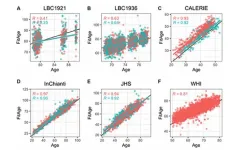(Press-News.org) Three men who had heart failure caused by the build-up of sticky, toxic proteins are now free of symptoms after their condition spontaneously reversed in an unprecedented case described by a team at UCL (University College London) and the Royal Free Hospital.
The condition, a form of amyloidosis affecting the heart, is progressive and has until now been seen as irreversible, with half of patients dying within four years of diagnosis.
The new study, published as a letter in The New England Journal of Medicine, reports on three men, aged 68, 76 and 82, who were diagnosed with transthyretin cardiac amyloidosis but who later recovered. Their own reports of symptoms improving was confirmed by objective assessments including cardiovascular magnetic resonance (CMR) scans showing that the build-up of amyloid proteins in the heart had cleared.
Lead author Professor Marianna Fontana (UCL Division of Medicine) said: “We have seen for the first time that the heart can get better with this disease. That has not been known until now and it raises the bar for what might be possible with new treatments.”
The researchers also found evidence of an immune response in the three men that specifically targeted amyloid. The amyloid-targeting antibodies were not found in other patients whose condition progressed as normal.
Senior author Professor Julian Gillmore (UCL Division of Medicine), Head of the UCL Centre for Amyloidosis, based at the Royal Free Hospital, said: “Whether these antibodies caused the patients’ recovery is not conclusively proven. However, our data indicates that this is highly likely and there is potential for such antibodies to be recreated in a lab and used as a therapy. We are currently investigating this further, although this research remains at a preliminary stage.”
Transthyretin (ATTR) amyloidosis is caused by amyloid deposits composed of a blood protein called transthyretin (TTR). It can be hereditary or non-hereditary (“wild-type”). The build-up of these protein deposits in the heart is called ATTR amyloid cardiomyopathy (ATTR-CM). Current treatments on the NHS aim to relieve the symptoms of heart failure (which may include fatigue, swelling in the legs or abdomen, and shortness of breath with activity), but do not tackle the amyloid (although a number of “gene-silencing” therapies are currently being trialled which reduce TTR protein concentration in the blood and thereby slow ongoing amyloid formation).
Advances in imaging techniques – some of which were pioneered at the UCL Centre for Amyloidosis – has meant substantially more people being diagnosed with the disease than was the case 20 years ago. Previously, diagnosis needed a biopsy (involving tissue taken from the heart).
The imaging techniques also mean the burden of amyloid on the heart, and consequently the progression of the disease, can be more precisely monitored, making it easier to detect cases where the condition has reversed, rather than merely remaining stable.
The latest study, supported by the Royal Free Charity, began when one man aged 68 reported his symptoms improving. This prompted the research team to look through records of 1,663 patients diagnosed with ATTR-CM. Out of these patients, two more cases were identified.
The three men’s recoveries were confirmed via blood tests, several imaging techniques including echocardiography (a type of ultrasound), CMR scans and scintigraphy (a nuclear medicine bone scan), and, for one patient, an assessment of exercise capacity. CMR scans showed heart structure and function had returned to a near-normal state and amyloid had almost completely cleared.
An in-depth look at the records and assessments for the rest of the 1,663 cohort indicated that these three patients were the only ones whose condition had reversed.
One of the three men underwent a heart muscle biopsy that revealed an atypical inflammatory response surrounding the amyloid deposits (including white blood cells known as macrophages), suggesting an immune reaction. No such inflammatory response was detected in 286 biopsies from patients whose disease had followed a normal progression.
Investigating this further, the researchers found antibodies in the three patients that bound specifically to ATTR amyloid deposits in mouse and human tissue and to synthetic ATTR amyloid. No such antibodies were present in 350 other patients in the cohort with a typical clinical course.
If these antibodies could be harnessed, they could be combined with new therapies being trialled that suppress TTR protein production, enabling clinicians to clear away amyloid as well as preventing further amyloid deposition.
One such promising therapy is a single intravenous infusion of NTLA-2001, a novel gene-editing therapy based on CRISPR/Cas9. Early results of the trial, led by Professor Gillmore, indicate it may stop disease progression.*
The UCL Centre for Amyloidosis is one of the world's leading centres for amyloid research. It includes the NHS National Amyloidosis Centre, the only centre in the UK specialising in amyloidosis.
Jon Spiers, chief executive of the Royal Free Charity, said: “As an NHS charity, we are proud to be supporting this research. Our priority is to drive early-stage research that brings innovative treatments to patients sooner.
“This work not only represents a major breakthrough in our understanding of cardiac amyloidosis, but crucially opens up new possibilities for more effective treatment options. It’s a hugely significant development that we welcome on behalf of all patients of the National Amyloidosis Centre and their families, many of whom have contributed to our research funding with their own fundraising efforts.”
The Royal Free Charity is the NHS charity partner of the Royal Free London NHS Foundation Trust and the only UK charity directly supporting the work of the National Amyloidosis Centre.
* This is the first-ever human trial in which CRISPR/Cas9, a Nobel Prize-winning technology that makes a cut in the cells’ DNA and inserts a new genetic code, has been infused intravenously as a medicine to inactivate a target gene in a specific organ - in this case, the liver where TTR protein is made.
END
Devastating heart condition can be reversed, study shows for the first time
Three men who had heart failure caused by the build-up of sticky, toxic proteins are now free of symptoms after their condition spontaneously reversed in an unprecedented case described by a team at UCL and the Royal Free Hospital.
2023-06-07
ELSE PRESS RELEASES FROM THIS DATE:
DNAmFitAge: Biological age indicator incorporating physical fitness
2023-06-07
“We expect DNAmFitAge will be a useful biomarker for quantifying fitness benefits at an epigenetic level and can be used to evaluate exercise-based interventions.”
BUFFALO, NY- June 7, 2023 – A new research paper was published in Aging (listed by MEDLINE/PubMed as "Aging (Albany NY)" and "Aging-US" by Web of Science) Volume 15, Issue 10, entitled, “DNAmFitAge: biological age indicator incorporating physical fitness.”
Physical fitness is a well-known correlate of health and the aging ...
Now is already too late – The European and international endocrine community calls for immediate action on chemicals legislation is the only way forward to address Endocrine Disrupting Chemicals
2023-06-07
Brussels, Belgium 7 June 2023 – The call for action reverberated across the halls of the European Parliament as a diverse group of scientists, policy makers and interest organisations gathered in a packed room, to discuss how to address the gaps between science and legislation and "Shape an ambitious legislative framework for endocrine disruptors."
“Through such meetings with experts, we as policy makers can obtain valuable insight into the latest available science and benefit from it in our legislative ...
Trouble falling asleep, staying asleep linked to increased risk of stroke
2023-06-07
MINNEAPOLIS – People who have insomnia symptoms such as trouble falling asleep, staying asleep and waking up too early, may be more likely to have a stroke, according to a study published in the June 7, 2023, online issue of Neurology®, the medical journal of the American Academy of Neurology. In addition, researchers found the risk was much higher in people under 50 years old. The study does not prove that insomnia symptoms cause stroke; it only shows an association.
“There are many therapies that can help people improve the quality of their sleep, so determining which sleep ...
Seizures while driving and why it’s important to diagnose epilepsy ASAP
2023-06-07
MINNEAPOLIS – Prior to being diagnosed with epilepsy, 5% of people with a type of epilepsy called focal epilepsy had a seizure while driving, according to a new study published in the June 7, 2023, online issue of Neurology®, the medical journal of the American Academy of Neurology.
Focal epilepsy accounts for more than half of all cases of epilepsy. People with this form of epilepsy have recurring seizures that affect one half of the brain.
“Seizures while driving pose substantial risks for those experiencing them and for others ...
Creating less-allergenic shrimp using pressure and steam
2023-06-07
With the start of summer, many people will be firing up their grills and roasting everything from hot dogs to steaks. Shrimp won’t be on the menu for millions of Americans with seafood allergies, though a method reported in ACS’ Journal of Agricultural and Food Chemistry could change that. The researchers say that reverse-pressure sterilization can produce a less-allergenic shrimp product that, when tested in mice sensitive to the crustaceans, did not cause severe reactions.
Some of the most common foods that people are allergic to are dairy products, wheat, peanuts and seafood. The immune system mistakes some proteins from these foods for an intruder and ...
Mechanical engineers lend fresh insight into battery-based desalination technology
2023-06-07
CHAMPAIGN, Ill. — To achieve more effective saltwater desalination, mechanical engineers focused on fluid movement rather than new materials in a new study. By adding microchannels to the inside of battery-like electrodes made of Prussian blue – an intense blue pigment often used in art that also has special chemical properties – researchers increased the extent of seawater desalination five times over their non-channeled counterparts to reach salinity levels below the freshwater threshold.
The study, led by University of Illinois Urbana-Champaign ...
Alcohol drinking cut in half with diabetes medication
2023-06-07
Semaglutide is sold under brand names such as Ozempic. Since this medication was also approved for the treatment of obesity, demand has increased, which has resulted in difficulties in procuring the drug in recent times. There is anecdotal evidence of patients with obesity or diabetes saying that their craving for alcohol has lessened since they started taking the drug.
Today, individuals with alcohol dependence are treated with a combination of various psychosocial methods and medications. Four approved medications are available. Since alcohol dependence is a disease with many causes, the efficacy of these medications varies, and so it is important that we develop additional treatment medications.
Reduced ...
Detection dog can sniff out highly-endangered great crested newts
2023-06-07
A trained detection dog was highly accurate at finding great crested newts underground or at a distance, which might aid conservation efforts for this highly-endangered species, according to a study published June 7, 2023 in the open-access journal PLOS ONE by Nicola Jayne Glover from the University of Salford, UK, and colleagues.
The highly-endangered great crested newt (Triturus cristatus) is a species of special conservation concern across the UK and central and northern Europe. While much is known about the great crested newts’ aquatic life phase, comparatively little is known about their terrestrial ...
Paris will host the 25th International Conference of the Redox Medicine Society with 61 communications this June in Paris
2023-06-07
The 25th International Conference on Redox Medicine 2023 which will be held in Paris on June 1-2 will welcome 61 communications (major, short and poster presentations), and gather international in-person and virtual participants from 31 countries.
Redox Medicine 2023: What are the recent advances and perspectives?
On its 25th anniversary, Redox Medicine 2023 will be held to bring together academic and industry experts in redox to discuss advances and recent innovation in this vast field.
The new president of the Redox Medicine Society, Dr. Carole Nicco, Université ...
Ancient genomes show that the farming lifestyle in northwestern Africa was ignited by oversea-migrants from Iberia 7,400 years ago
2023-06-07
A genomic analysis of ancient human remains from Morocco in northwest Africa revealed that food production was introduced by Neolithic European and Levantine migrants and then adopted by local groups. A research team from Sweden, Spain and Morocco present their results in Nature on June 7th.
In northwestern Africa, lifestyle transitioned from foraging to farming some 7,400 years ago, but what sparked that change remained unclear. Previous studies support conflicting views: that migrant European Neolithic farmers brought the new way of life to North Africa, or that local hunter-gatherers adopted farming practices.
“We found a remarkable population continuity ...
LAST 30 PRESS RELEASES:
Scientists show how to predict world’s deadly scorpion hotspots
ASU researchers to lead AAAS panel on water insecurity in the United States
ASU professor Anne Stone to present at AAAS Conference in Phoenix on ancient origins of modern disease
Proposals for exploring viruses and skin as the next experimental quantum frontiers share US$30,000 science award
ASU researchers showcase scalable tech solutions for older adults living alone with cognitive decline at AAAS 2026
Scientists identify smooth regional trends in fruit fly survival strategies
Antipathy toward snakes? Your parents likely talked you into that at an early age
Sylvester Cancer Tip Sheet for Feb. 2026
Online exposure to medical misinformation concentrated among older adults
Telehealth improves access to genetic services for adult survivors of childhood cancers
Outdated mortality benchmarks risk missing early signs of famine and delay recognizing mass starvation
Newly discovered bacterium converts carbon dioxide into chemicals using electricity
Flipping and reversing mini-proteins could improve disease treatment
Scientists reveal major hidden source of atmospheric nitrogen pollution in fragile lake basin
Biochar emerges as a powerful tool for soil carbon neutrality and climate mitigation
Tiny cell messengers show big promise for safer protein and gene delivery
AMS releases statement regarding the decision to rescind EPA’s 2009 Endangerment Finding
Parents’ alcohol and drug use influences their children’s consumption, research shows
Modular assembly of chiral nitrogen-bridged rings achieved by palladium-catalyzed diastereoselective and enantioselective cascade cyclization reactions
Promoting civic engagement
AMS Science Preview: Hurricane slowdown, school snow days
Deforestation in the Amazon raises the surface temperature by 3 °C during the dry season
Model more accurately maps the impact of frost on corn crops
How did humans develop sharp vision? Lab-grown retinas show likely answer
Sour grapes? Taste, experience of sour foods depends on individual consumer
At AAAS, professor Krystal Tsosie argues the future of science must be Indigenous-led
From the lab to the living room: Decoding Parkinson’s patients movements in the real world
Research advances in porous materials, as highlighted in the 2025 Nobel Prize in Chemistry
Sally C. Morton, executive vice president of ASU Knowledge Enterprise, presents a bold and practical framework for moving research from discovery to real-world impact
Biochemical parameters in patients with diabetic nephropathy versus individuals with diabetes alone, non-diabetic nephropathy, and healthy controls
[Press-News.org] Devastating heart condition can be reversed, study shows for the first timeThree men who had heart failure caused by the build-up of sticky, toxic proteins are now free of symptoms after their condition spontaneously reversed in an unprecedented case described by a team at UCL and the Royal Free Hospital.





